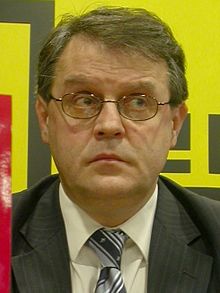Nebojša Čović
| Nebojša Čović Небојша Човић |
|
|---|---|

Čović at an SDP press conference in June 2006.
|
|
| Deputy Prime Minister of Serbia | |
|
In office 25 January 2001 – 3 March 2004 |
|
| Prime Minister |
Zoran Đinđić Zoran Živković |
| Preceded by | Spasoje Krunić |
| Succeeded by | Miroljub Labus |
|
Prime Minister of Serbia Acting |
|
|
In office 12 March 2003 – 16 March 2003 |
|
| 66th Mayor of Belgrade | |
|
In office 23 June 1994 – 21 February 1997 |
|
| Preceded by | Slobodanka Gruden |
| Succeeded by | Zoran Đinđić |
| Personal details | |
| Born |
2 July 1958 Belgrade, PR Serbia, FPR Yugoslavia |
| Nationality | Serbian |
| Political party |
SPS (1990–1997) Dem. Alternative (1997–2005) SDP (2005–2010) |
| Alma mater | University of Belgrade |
| Religion | Serb Orthodox |
Nebojša Čović (Serbian Cyrillic: Небојша Човић; born 2 July 1958) is a Serbian politician, businessman, and sports administrator.
Čović was born in Belgrade, PR Serbia, FPR Yugoslavia, and graduated from the University of Belgrade's Faculty of Mechanical Engineering. In 2000, he obtained his Ph.D at the same university.
In 1992, as a member of the Socialist Party of Serbia (SPS), 34-year-old Čović started his climb up the political ladder with a position of executive board vice-president in charge of economy and finances at the Belgrade city assembly.
A year later, in 1993, he advanced to the position of the city government president. In 1994 he got elected as the Mayor of Belgrade. In parallel, Čović was the SPS deputy (MP) in the Serbian National Assembly. Čović was sacked from the mayoral post in mid January 1997 by the Serbian president and SPS party leader Slobodan Milošević amid the months-long protests in Serbia over the November 1996 municipal elections fraud. He was expelled from SPS on the same occasion.
He became the president of Democratic Alternative (DA) after the party got formed by certain number of SPS members seceded from SPS in July 1997.
Čović served as the head of the Kosovo Coordination Centre and the head of the Southern Serbia Coordination Centre during Preševo Valley conflict (1999–2001).
...
Wikipedia
